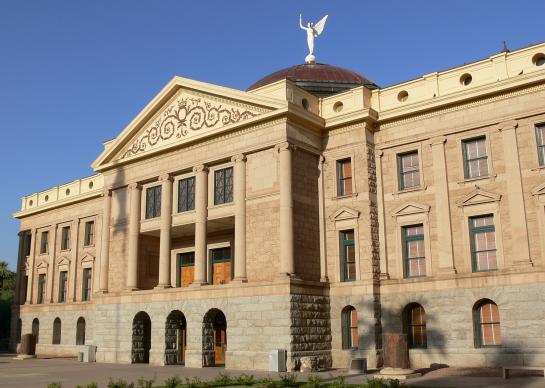AZ Legislative Update 03-03-2023

Partisan debates and policy disagreements took center stage at the Arizona Capitol this week. Lawmakers spent long days in floor sessions, advancing proposals that still require committee hearings in the second chamber of the legislature. Legislators sent three more bills to the Governor’s desk for consideration: changes to local governments’ review of some planning proposals, limits on the legislature’s process for considering changes to medical professionals’ scope of practice, and a routine bill that aligns state tax laws with federal standards.
The most prominent debate this week focused on process, rather than policy. House Democrats voted against dozens of bills in protest of an unwritten rule that any proposal must have support from at least 16 of the 31 House Republicans before it can go to a vote. Democratic leaders deplored the rule as an “abuse of power”; Republican leaders said it’s nothing new and legislators of both parties must show their bill has support before it goes to a vote.
The dispute – and partisan disagreements on policies – delayed voting on many bills, but House Republicans overcame the Democrats’ “no” votes to pass some controversial proposals. They advanced bills to make home sellers disclose more information about water, limit ADOT’s highway messaging, require schools to teach gun safety, allow a political candidate to question the County Recorder about election proceedings, apply stronger assault penalties when a victim is pregnant, limit access to Tik Tok on state employee phones, prevent cities from banning backyard chickens, and increase legislative authority over the actions of public service corporations.
Early in the week, the House did manage to find bipartisan support for bills to allow courts to consider work time credit when adjusting probation time, reinstate the Drug Overdose Fatality Review Team, and alter local governments’ processes for reviewing some licenses or permits.
In the Senate, members of both political parties voted to keep legislators’ home addresses secret, require a Governor’s inaugural fund to be public, and give discharged inmates the documentation they’ll need to work.
There were sharp partisan divides on some Senate proposals, as well. Senate Republicans approved many controversial bills despite Democratic opposition – including cuts to unemployment benefits, standards for school bathrooms, criminal penalties for homeless encampments, new licensing requirements for attorneys, and voter ID requirements for those who drop off an early ballot.
Some measures didn’t find the support needed to pass, though. Legislators failed to pass a requirement that election officials tabulate early ballots at the polls, a new way for individuals convicted of a misdemeanor to have their record expunged, a ban on state construction of bicycle paths and pedestrian walkways, an extension of the Arizona Grain Research and Promotion Council, and a proposal that would ask voters to overturn cities’ self-governing charters.
Priority Bill Update
The legislature did not advance priority bills last week. Next week, the Senate Education Committee is scheduled to consider HB 2460 (suspension; requirements; K-4 students).
Senate Democrats Shake Up Leadership Team
Senate Democrats chose a new team to lead their caucus this legislative term, after two of their current leadership team members resigned from those positions. Senator Raquel Terán (D-Phoenix), the former Minority Leader, will continue to serve in the Senate but is pursuing a potential run for Congress. Senator Rosanna Gabaldón (D-Green Valley) resigned from her role as Minority Whip to focus her efforts on being a member of the Senate rather than a leader in the Democratic caucus.
The new Democratic leadership team will include Senator Mitzi Epstein (D-Tempe) as Minority Leader, Senator Juan Mendez (D-Tempe) as Assistant Minority Leader, and Senator Eva Burch (D-Mesa) as Minority Whip. Senator Lela Alston (D-Phoenix) will continue to serve as the caucus chair.
This change is unlikely to shift the Democratic caucus priorities, since the new leaders share the goals established by the caucus earlier this year. The mid-session change is unusual, though, and a sign of future shifts that could come as more lawmakers position themselves to run for different offices in 2024.
Budget Update: They’re Talking About Talking
The Governor and Republican leaders have opened a tentative pathway into budget negotiations. In response to a request for a budget meeting from the Governor’s office, the Senate President and House Speaker wrote a letter objecting to the Governor’s veto of their baseline budget and her desire to change the partisan makeup of the legislature in the next election cycle. “That being said,” the Republicans conceded, “we are open to meeting to discuss how a budget process may move forward.”
This may not be an ideal start to budget talks and it is certainly different than the less formal process Republican leaders followed with Republican Governor Doug Ducey, but it is at least a start in the difficult process to get a bipartisan budget agreement.
In the News
The Board of Education is hearing frustrations about administration of the Empowerment Scholarship Account (ESA) program.